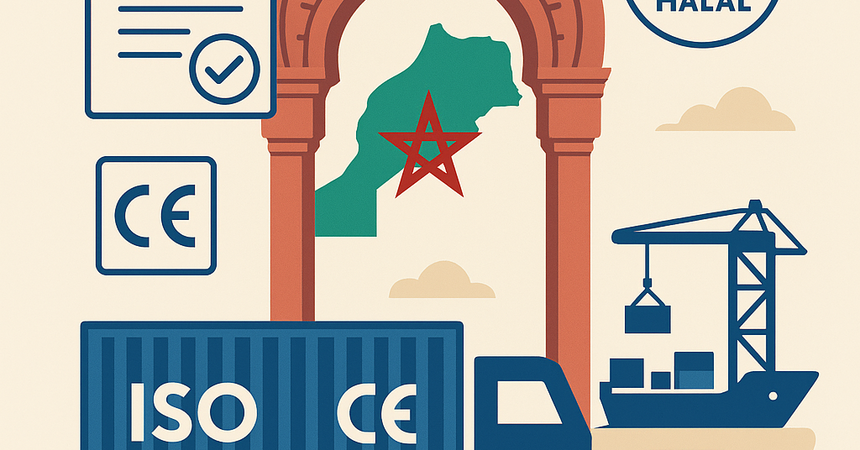Morocco occupies a strategic position between Europe and Africa, making it one of the most attractive export destinations. Free trade agreements with the EU, the USA, and African countries provide access to millions of consumers. However, successful export is impossible without compliance with quality and safety requirements.
The main task for companies is to prepare certification in advance in order to avoid delays at customs, fines, and reputation loss.
General Certification Rules for Exporting to Morocco
National Standards System
Moroccan standards (NM — Normes Marocaines) are largely harmonized with European ones. This means that products certified under ISO or CE enjoy simplified access to the market.
International Certificates
In many cases, it is sufficient to confirm compliance with international standards — this helps avoid double certification and accelerates market entry.
Sector-specific Requirements
Each industry has its own certification specifics. The strictest requirements apply to food, medicine, construction, and energy sectors.
Which Certificates Are Needed for Exporting Goods to Morocco
1. Food Products
- ISO 22000 and HACCP — mandatory for food producers.
- Halal certification — crucial, since over 99% of Morocco’s population is Muslim.
- GlobalG.A.P. — for agricultural products, especially fruits, vegetables, and seafood.
- CE marking — recognized in Morocco, mandatory for electrical equipment, construction materials, machinery, and tools.
- ISO 9001 — increases chances of securing contracts, especially with government bodies.
- ISO 14001 — for products with environmental impact.
- GMP (Good Manufacturing Practice) — required for pharmaceutical producers.
- ISO 13485 — for medical devices.
- Registration with the Moroccan Ministry of Health — mandatory for importing medicines.
- ISO 9001 and ISO 45001 — required for participation in government tenders.
- CE marking — for materials imported from Europe or supplied to the EU market.
- REACH (European standard) — for chemicals, especially when exporting to the EU.
- ISO 22716 (Cosmetics GMP) — for cosmetic products.
- Additional environmental certification may be required (EcoCert, ISO 14001).
Which Certificates Are Needed for Exporting Services
Morocco is actively developing in IT, construction, logistics, and energy. Exporting services also requires quality confirmation:- ISO/IEC 27001 — for IT companies (information security).
- ISO 9001 — for companies participating in international tenders.
- ISO 45001 — for construction contractors.
- ISO 50001 — for companies in the energy and renewables sector.
Common Mistakes of Exporters
- Late preparation for certification — documents are already checked at the customs stage.
- Incomplete set of certificates — e.g., obtaining only ISO 9001 when HACCP or Halal are also required.
- Ignoring sector-specific requirements — especially in medicine and food production.
- Working without a local partner — for certain categories, a representative in Morocco is mandatory.
Conclusion
Entering the Moroccan market opens huge opportunities for manufacturers and service providers. But the key to success lies in having international and national certification, which ensures:- free access to the market,
- consumer and partner trust,
- competitive advantages in tenders and negotiations.
